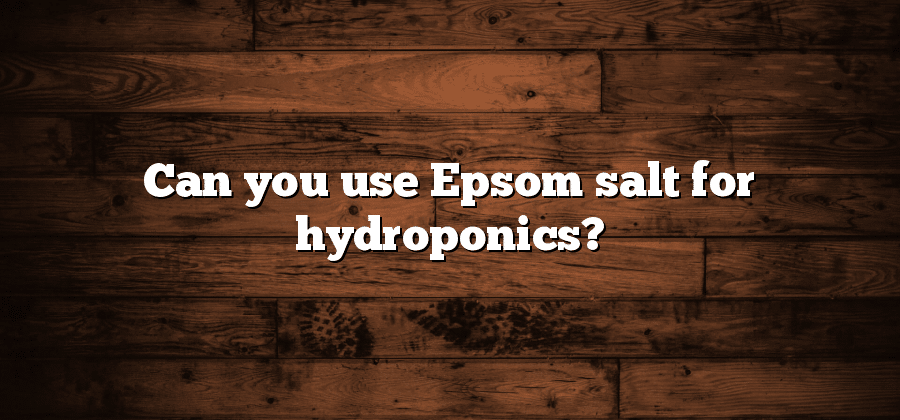Understanding Epsom Salt
Epsom salt is a commonly used substance in gardening and agriculture, known for its numerous benefits. Derived from the mineral-rich waters of Epsom, England, this salt is composed of magnesium sulfate. Magnesium is an essential nutrient for plant growth, playing a crucial role in the synthesis of chlorophyll and the activation of enzymes. While other sources of magnesium exist, Epsom salt has gained popularity due to its effectiveness and affordability.
In addition to magnesium, Epsom salt also provides sulfur, another important nutrient for plants. Sulfur aids in the formation of proteins, enzymes, and vitamins, contributing to both the overall health and yield of plants. By incorporating Epsom salt into their gardening routines, both amateur and experienced gardeners can ensure that their plants have access to these vital nutrients, leading to stronger, healthier, and more vibrant growth.
Importance of Nutrients in Hydroponics
Hydroponics is a revolutionary method of growing plants that eliminates the need for soil. Instead, plants are grown in nutrient-rich water solutions, allowing for controlled and precise delivery of essential elements. One critical aspect of successful hydroponic cultivation is the understanding and importance of nutrients.
Unlike traditional soil-based agriculture, hydroponics requires a meticulous approach to providing plants with the necessary elements to thrive. In a hydroponic system, plants are entirely dependent on the nutrient solution for their growth and development. Therefore, it becomes imperative to provide these plants with all the essential nutrients in the correct proportions.
The balance and availability of nutrients directly impact plant health, productivity, and overall yield in hydroponics. By tailoring nutrient solutions to meet specific plant requirements, growers can optimize growth factors and create an ideal environment for plants to flourish. Ensuring an adequate supply of nutrients is vital, as deficiencies or excesses can lead to stunted growth, nutrient lockout, or even plant fatalities. As such, maintaining the proper nutrient balance is crucial for the success of hydroponics.
Role of Magnesium in Plant Growth
Magnesium is an essential macronutrient for plants and plays a crucial role in their growth and development. It is involved in various physiological processes that are vital for plant health. One of the primary functions of magnesium is its participation in chlorophyll synthesis, which is responsible for the green color of leaves. Without an adequate supply of magnesium, plants exhibit yellowing or mottling of leaves, as chlorophyll production is significantly reduced.
Moreover, magnesium is involved in the activation of enzymes responsible for the metabolism of carbohydrates and proteins. This helps in energy production and the synthesis of essential molecules required for plant growth. It also aids in the transport and uptake of other nutrients from the soil, such as phosphorus and potassium. As a result, magnesium deficiency can lead to stunted growth and poor overall plant vigor. Therefore, ensuring sufficient magnesium levels is crucial for maximizing plant growth potential.
How Epsom Salt Provides Magnesium
Epsom salt, also known as magnesium sulfate, plays a crucial role in providing plants with the essential mineral magnesium. Magnesium is an important nutrient for plant growth as it is involved in several critical processes, including photosynthesis, chlorophyll production, and enzyme activation. It is necessary for plants to have an adequate supply of magnesium in order to thrive and develop properly.
When added to hydroponic systems, Epsom salt acts as a convenient and readily available source of magnesium for plants. It dissolves easily in water, allowing the magnesium ions to be taken up by the plant roots. This ensures that the plants receive a consistent and sufficient supply of magnesium throughout their growth cycle, promoting healthy development and enhancing the overall productivity of the hydroponic system. Epsom salt can be a valuable tool for hydroponic growers looking to optimize their nutrient management and provide their plants with the vital magnesium they need to flourish.
The Effectiveness of Epsom Salt in Hydroponics
Research has shown that Epsom salt can have a significant impact on the effectiveness of hydroponic systems. Hydroponics, the method of growing plants without soil, relies heavily on the nutrient solution provided to the plants. Magnesium, one of the essential nutrients required by plants, plays a vital role in their growth and development. Epsom salt, chemically known as magnesium sulfate, provides the necessary magnesium for plants in hydroponics.
Magnesium is a key component in the production of chlorophyll, the pigment responsible for the green color in plants. It is also involved in several enzymatic reactions that regulate plant growth processes. Without a sufficient amount of magnesium, plants in hydroponic systems may become stunted, exhibit yellowing of leaves, and exhibit poor overall growth. Epsom salt acts as a readily available source of magnesium, ensuring that plants in hydroponics receive the necessary nutrients for optimal growth and productivity. Its effectiveness lies in its ability to enhance the overall nutrient uptake and utilization by the plants, resulting in healthier and more vigorous growth.






